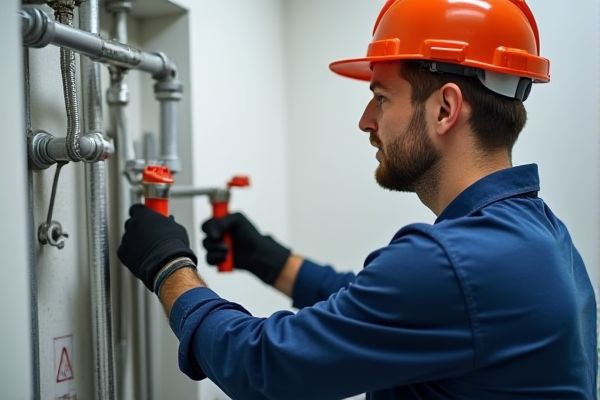
Germany's plumbing sector is experiencing a high demand for skilled professionals due to ongoing infrastructure projects and increasing renovation activities. Vocational training programs and apprenticeships are common pathways for entering this field, providing practical experience and certification. Many companies offer competitive salaries, benefits, and opportunities for career advancement, including specialization in areas like green plumbing or energy-efficient systems. Proficiency in the German language can enhance job prospects, as effective communication with clients and contractors is often essential.
Job Description
Plumbing jobs in Germany require skilled professionals who can handle various tasks, including installation, maintenance, and repair of water supply systems and waste disposal. Technicians must be familiar with local building codes and safety regulations, ensuring compliance throughout their work. Experience with modern plumbing technologies, such as smart home systems or energy-efficient installations, is increasingly valued in the industry. Your proficiency and adherence to standards can greatly enhance job prospects in Germany's growing construction and renovation sectors.
Requirement
In Germany, plumbing jobs typically require vocational training as a skilled tradesperson, known as an "Installateur" or "Sanitar-, Heizung- und Klimatechniker." Candidates often need to complete a formal apprenticeship lasting around three years, which combines classroom learning with hands-on experience. A valid work permit may be necessary for non-EU citizens, and proficiency in German is crucial for effective communication with clients and colleagues. Certifications or additional qualifications in areas like gas installations or renewable energy systems are highly regarded and can enhance your job prospects.
Salary and Perks Expected
Plumbing jobs in Germany offer competitive salaries that typically range from EUR30,000 to EUR45,000 annually, depending on experience and location. Many employers provide additional perks such as health insurance, retirement plans, and opportunities for professional development. Skilled plumbers can also benefit from a strong job market, with a consistent demand in both residential and commercial sectors. Understanding the industry standards and regional differences can help you negotiate a better compensation package.
Similar Job Names
- Installateur fur Sanitar-, Heizungs- und Klimatechnik
- Rohrleitungsbauer
- Fachkraft fur Wasserversorgungstechnik
- Klempner
- Sanitarinstallateur
- Heizungsinstallateur
- Abwassertechniker
- Bautechniker im Sanitarbereich
- Service-Techniker fur Heizungsanlagen
- Kundendiensttechniker fur Sanitaranlagen
- Projektleiter im Bereich Sanitar und Heizung
- Meister fur Sanitar-, Heizungs- und Klimatechnik
- Lehrling im Installations- und Heizungsbau
- Instandhaltungsmechaniker fur Rohrsysteme
- Techniker fur erneuerbare Energien im Sanitarbereich
Job Expectation Concept
Plumbing jobs in Germany encompass a wide range of responsibilities, including installing, repairing, and maintaining piping systems in residential and commercial properties. You might also be involved in ensuring compliance with local building codes and regulations, which are quite stringent in Germany. Understanding the use of modern materials and technologies, such as energy-efficient heating systems and water-saving fixtures, is essential for success in this field. The demand for skilled plumbers remains high, offering various opportunities for career advancement and specialization.
Career Advantage and Weakness
Plumbing jobs in Germany offer a significant career advantage through robust job security and consistent demand for skilled professionals, particularly in urban areas. With a strong emphasis on vocational training, you benefit from well-structured apprenticeships that enhance your technical skills and career growth potential. However, the physically demanding nature of the job can be a drawback, requiring long hours in challenging conditions. Additionally, German regulations and adherence to quality standards necessitate ongoing education and certification, which may be seen as an obstacle by some.
Important Thing Must Know
Understanding the plumbing job market in Germany involves recognizing qualifications and certifications required for work. To legally practice as a plumber, obtaining a Meisterbrief, or master craftsman certificate, is essential. Fluency in German can significantly improve your chances of securing a position, as most employers require strong communication skills. Salary expectations vary, with experienced plumbers earning between EUR30,000 and EUR50,000 annually, depending on location and specialization. Knowledge of local regulations and eco-friendly practices is also crucial for navigating the German plumbing industry.
Alternative Career Options
Germany offers various alternative career options for plumbing professionals seeking to diversify their skills. Opportunities in renewable energy systems, particularly solar thermal and biomass technology, have gained traction as the country emphasizes sustainability. You can also consider advancements in building services engineering, specializing in HVAC and water management systems, which are essential in modern construction. Exploring roles in construction management or facility maintenance can further broaden your career trajectory within the thriving German job market.
Companies List
- Wilo SE
- Grohe AG
- Viega GmbH & Co. KG
- KSB SE & Co. KGaA
- Santex Rimar Group
- Brawoliner GmbH
- REHAU AG + Co
- Oventrop GmbH & Co. KG
- KME Germany GmbH
- F.W. Eickhoff GmbH
List of Ideal City
Germany offers several cities that are ideal for plumbing jobs, with strong demand for skilled plumbers. Munich stands out due to its robust economy and numerous construction projects, providing ample opportunities for employment. Berlin is another prime location, attracting a diverse population that fuels continuous infrastructure development. Stuttgart also presents a favorable job market, particularly with its expanding automotive industry, which often requires plumbing expertise for both residential and commercial installations.
 germanyjobsdata.com
germanyjobsdata.com